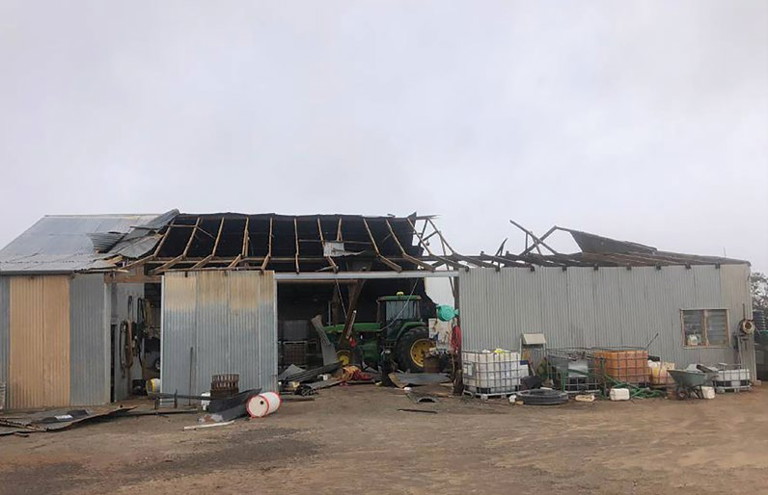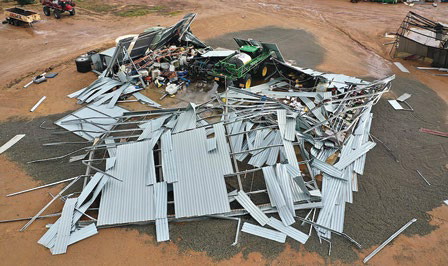Natural disaster support update
BY THE DEPARTMENT OF PRIMARY INDUSTRIES AND REGIONAL DEVELOPMENT
On the evening of April 11, 2021, Severe Tropical Cyclone Seroja made landfall between Kalbarri and Port Gregory in the Shire of Northampton.
The dangerous system brought destructive winds and heavy rainfall to coastal areas and continued inland impacting additional communities.
Cyclone Seroja has been proclaimed an eligible disaster under the Disaster Recovery Funding Arrangements Western Australia (DRFAWA).
Assistance may be available toward freight costs, materials for boundary fences (only where it is demonstrated that public safety is at risk), professional advice grants and interest rate subsidies on ‘new’ loans approved by Authorised
Deposit-taking Institutions to assist with recovery.
Following the cyclone, staff from the Department of Primary Industries and Regional Development (DPIRD) assessed 20 horticultural properties in the Geraldton and Northampton areas for damage and found it varied according to location.
Damage to field-grown horticultural crops was limited to tomato crops being blown over and young pumpkin and melon crops suffering damage or loss.
There was also infrastructure damage to protected cropping tunnel houses.
The DRFA assessment is not yet complete and growers seeking assistance are encouraged to access available support.
For primary producers — eligible support measures under the DRFAWA are administered by DPIRD.
Support measures under the DRFAWA are administered by DPIRD for primary producers.
For details of the Disaster Recovery Funding Arrangements please visit the Emergency-response/disasterrecovery-funding-arrangements page on the DPIRD webpage (see link under more information).
To apply for support, an application should be submitted online, together with suppliers' invoices, evidence of payment and a tax invoice to DPIRD using the department's online Grant Management System by the specified date for each event. Submissions close midnight October 14, 2021.
Flood in Carnarvon declared natural disaster
In early February, a tropical low dumped hundreds of millimetres of rain across northwest Western Australia, causing the worst floods in the Gascoyne region in a decade.
DPIRD mobilised a team of horticulture and soil specialists to assess the impact of the flood on growers and inform the Disaster Recovery Funding Arrangements (DRFA).

LATHAM farmer Dylan Hirsch lost his main workshop along with other infrastructure such as windmills, fuel storage, fertiliser sheds, stored fertiliser and fences.
PHOTO © WWW.THELAND.COM.AU
Based on advice provided in the report, supporting data, and discussions with DPIRD staff, the Department of Fire and Emergency Services (DFES) advised that the criteria for activation of DRFA Category C Recovery Grants for Primary Producers had not been met.
Throughout March, DPIRD focused on identifying and testing suitable soil, and assessing requirements to overcome barriers in accessing each site and helping to prioritise discussion required for approvals.
To apply for support, an application should be submitted online.

PHOTO © TRIN SUCKLING
The process to access soil is complex and involves many agencies.
DPRID has been liaising with the departments of Mines, Industry Regulation and Safety (DMIRS), Planning, Land and Heritage (DPLH), and Water and Environmental Resources (DWER).
In addition, DPIRD has approached the Yamatji Marlpa Aboriginal Corporation (YMAC) to assess cultural or heritage values on the land being considered.
All land being considered is Crown land, including the blocks of the Gascoyne Food Bowl Initiative (GFBI).
Products such as sand and aggregates, including rock, are considered Basic Raw Materials.
On Crown land, Basic Raw Materials are deemed to be minerals, and extraction of minerals is administered under the Mining Act 1978.
Therefore, while a mining lease may be made over Reserve land, no mining can commence without the consent of the Minister for Mines.
Native Title legislation procedures must be satisfied before the Minister will approve a mining tenement.
MORE INFORMATION
www.agric.wa.gov.au/emergency-response/ disaster-recovery-funding-arrangements